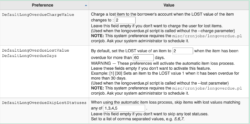What is Long Overdue (Lost) Anyway?
When an item becomes sufficiently overdue, Koha can automatically give it a lost status. This process is handled by the cronjob longoverdue.pl. There is a lot of possible customization around the specifics of what this cronjob does. The controls for those customizations live in several different places. In this post, I want to walk through some of those options and where you can see and change them.

How can I tell when and how my system will mark something Long Overdue?
There are three fundamental Long Overdue setup questions to start:
- At how many days overdue should an item be marked lost?
- Which specific variety of lost should the item be marked with?
- Should we charge the patron the item's replacement cost when we mark it lost?
The answers to these questions might be in your system preferences.

To find the relevant system preferences in your system, go to Administration and search the system preferences for "LongOverdue." You should find four system preferences. In the screenshot above, I've got my Koha system to set items to Long Overdue (Lost) at 60 days overdue and to charge the patron the item's replacement fee when it does so.
(Remember that Koha thinks about lost statuses in terms of numeric codes. The "2" in my screenshot corresponds to Long Overdue (Lost) in my LOST authorized value. If you want more details on lost statuses and authorized values, check out this Monday Minutes video on the subject.)
However, those system preferences don't tell the whole story. For starters, we have this note: "This system preference requires the misc/cronjobs/longoverdue.pl cronjob. Ask your system administrator to schedule it." The system preferences don't do anything unless the longoverdue cronjob is running on your site. There isn't a way to verify whether or not the cron is active from within Koha, but we're happy to confirm it for you. Just ask!
But what if my system preferences are blank?
To complicate things a bit further, you may find that your system preferences are blank and items are getting marked lost by the cronjob anyway. There are a couple of possible reasons for this.
First, these system preferences are only a few years old. Before the system preferences existed, those same settings were all defined directly in the cronjob setup on a library's server. If you've been on Koha for a while, it's possible your long overdue behavior is still defined in the cronjob setup rather than in the system preferences. This works fine, but is a little inconvenient as it keeps you from being able to see or change those settings without our help. We're happy to move those settings from the cronjob setup to the system preferences for anyone who asks!
The second option is your long overdue system preferences may be blank if your system is set up to do fancy stuff the system preferences don't know about.
What do you mean "fancy stuff?"
Over the years, the long overdue cronjob has learned to do some fancy stuff. It can be set to only include certain patron categories or certain item types. However, those settings don't have system preferences and so they need to be set in the cronjob setup.
We would also need to move your long overdue setup into the cronjob in order to accomplish something like this:

This partner is running longoverdue.pl twice. At 14 days overdue, the item is set to Long Overdue (Lost) and the patron is charged the replacement cost. If the item still hasn't been returned once we reach 60 days, it gets moved over to regular Lost (without charging the patron a second time).
There is a general understanding in the Koha community that folks would rather be able to see and change all aspects of their long overdue process directly within the Koha staff site. However, this is more of a longterm goal. In the meantime, if you want your long overdue process to do something the system preferences cannot handle on their own, just open up a ticket and we'll be happy to help.
Read more by Andrew Fuerste-Henry

